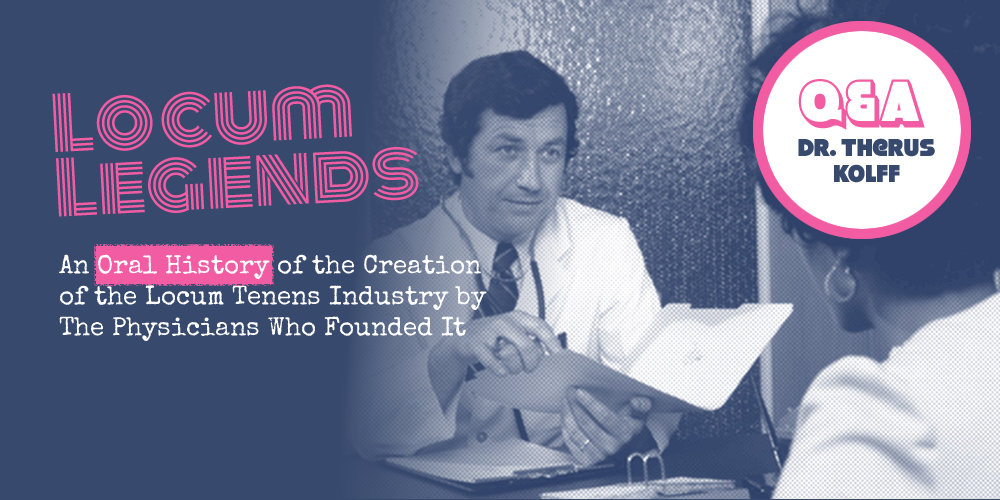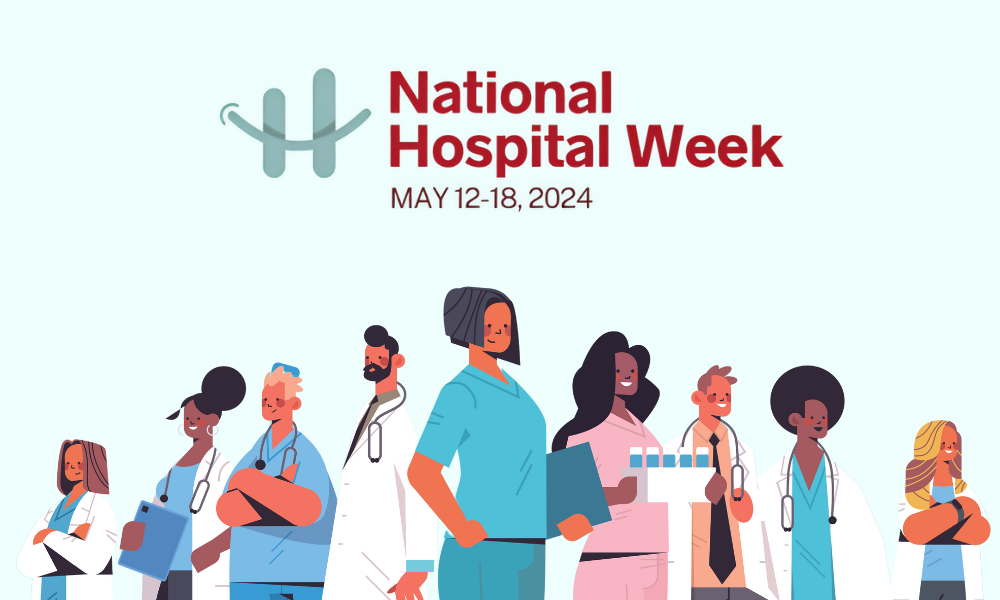As we celebrate National Locum Tenens Week 2023, Locumpedia steps back in time to tell the untold story of how enterprising doctors in the 1970s revolutionized the delivery of healthcare with locum tenens, a $6 billion staffing juggernaut.
These trailblazers played an instrumental role in shaping the industry during its nascent stages. Their unparalleled foresight and resourcefulness revolutionized healthcare staffing, providing an invaluable service to physicians, healthcare facilities, and millions of patients.
In an exclusive Q&A session with Locumpedia, we had the privilege of sitting with Dr. Therus Kolff, one of the industry’s founding figures.
Tucked away in the corner of a study in a cabin high up in the Adirondack Mountains of New York, Dr. Kolff chats with us about the journey into locum tenens, including where this name came from, the many “stupid mistakes,” triumphs, and pivotal moments that shaped the locums landscape into what we know it as today.
It’s perhaps unsurprising that Dr. Kolff would make a lasting contribution to the field of medicine. Innovation runs in the family, after all. His father, Dr. Willem Johan Kolff, invented the first operational dialysis machine in the 1940s while working in the Netherlands.
Through spotty Wi-Fi connections and torrential rains, Dr. Kolff paints a picture of the early days of locum tenens. He talks about his world travels post-medical school at the University of Utah, where he graduated in 1974, and post-residency. His travels brought him to the doorsteps of the Health Systems Research Institute (HSRI), where he would reunite with his friend, colleague, and future partner, Dr. Alan Kronhaus.
After helping recruit doctors to rural communities and working with medical teams in Yellowstone National Park on temporary assignments, he saw a greater opportunity that sparked an idea he thought could one day serve communities nationwide. He knew many other doctors like him wanted to travel, learn new skills, and provide quality care to patients in communities that don’t have the same access as patients in larger metropolitan markets.
Kolff returned to school at Harvard University, where in 1979, he completed his degree in Health Policy and Management.
The knowledge he gained led him to spearhead his own company, CompHealth, which launched the locums movement nationwide.
Locumpedia: Let’s go back to the beginning for the full story of this industry that has grown into one of the most significant segments of healthcare staffing. I spoke to your colleague Dr. Alan Kronhaus yesterday. Can you tell us your perspective on the origin of locum tenens and where the idea for it came from?
Dr. Therus Kolff: I got involved with a rural healthcare group called Health Systems Research Institute, a nonprofit profit group in Salt Lake City, Utah. We were developing an alternative to the National Health Service Corp by putting physicians out into communities where there weren’t any for one reason or another. One of the keys to that was providing them some support so they could take time for a vacation, continuing education and just the ability to get a break.
The other thing we were doing is we were staffing doctors at Yellowstone National Park. That park has millions of people visiting in the summer. We were staffing full healthcare capabilities there in conjunction with the University of Utah.
We had physicians working with us, and they were wondering, “OK, we’ve worked up here during the summer. Now what are we going to do come September, October, and December?”
After that experience [with HSRI], I went back to Boston and got a master’s in Health Policy and Management, and in 1979, I started CompHealth to take advantage of what I saw as an opportunity in staffing physicians in locum tenens.
Locumpedia: So, you had proof of this concept and the need in the healthcare industry, but what would you say was the initial reaction from the communities where you wanted to send these temporary physicians?
TK: It was a time when people cocked their heads at you a little bit and looked at you cross-eyed, saying, “Are you out of your mind? That’s not going to work.”
But we knew if these doctors were carefully vetted and credentialed because everyone would be carefully watching what they were doing – figuratively – practicing in a fishbowl – It would work. They were independent contractors and really good physicians. If you’re a lousy physician, you can’t hide in a new community. As a result, we really ended up having a great track record with these communities.
Initially, there was an opportunity to do this and provide locum tenens in the Western states in primary care for more isolated rural communities. Still, it ended up being that we could provide locum tenens in just about every specialty. After about five years, it hit a hockey-stick inflection point and grew.
Locumpedia: Could you tell me how we landed on the name “locum tenens”? I understand the meaning behind the Latin phrase, but I was wondering if you could recall its inception and why this specific term was chosen.
TK: “Locum tenens” was first used by visiting or itinerate clergy in England. That subsequently grew to include physicians, so the term was well understood in the UK. It just seemed natural for us to use that term as we got started.
And it just sounded better than “temporary physician” or “a temp.” And, of course, way better than “Kelly Doc” — as everyone was familiar at the time with the first significant staffing in the form of “Kelly Girl.”
The “marketing” concept was tough enough in those early years. “Who would do that?” “What’s wrong with them?” And the objections would go on and on, despite presenting great CVs and proven clinicians with great references. So, a little Latin didn’t hurt.
Locumpedia: Clearly, it caught on! Let’s go back in time a bit and talk about HSRI. What first drew you to work at HSRI?
TK: Well, [laughs] that’s a great question. So, much of life is fortuitous in what happens to us. I was pretty young, and I had just traveled around the world, and HSRI needed a physician in Hannah, Wyoming, of all places. I went out as a solo practitioner taking care of 3,000 coal miners and ranchers while HSRI recruited a permanent doctor.
So, I was a locum tenens provider, and then as I began to do locums while they recruited, I became more and more interested in the structure and how it would be done best.
I ended up working in Nevada, Wyoming, Montana, and Utah, and eventually, I sort of got the idea that maybe there’s something more permanent here. Like so many things in life, you meet at a crossroads, see an opportunity, and take advantage of it – or don’t.
I initially thought it would be primarily for primary care for the West, and my goodness, was I wrong. What a wonderful thing to be proven wrong!
Locumpedia: Were there specialties you started to see that had a greater need for locum tenens, or was it just the full spectrum of medicine?
TK: As we grew, it was primary care—internal medicine, family practice, and then we ended up saying this is just getting too big for us to handle as a team. So, we’re going to use the Mississippi River, and one group will handle the East Coast, and then one will handle the West.
There was one time with a sort of strange experience — I don’t think it ever happens today. But we were in the office one day, and suddenly an orthopedic surgeon walked in and said, “Hey, I understand you guys are doing something with locum tenens. Have you ever considered doing it with orthopedics?”
Just as he asked about that, we got a call from a Naval base, and their orthopedic surgeon had reached into a dishwasher and lacerated his thumb.
They called and said, “Any chance you guys do locum tenens for orthopedic surgeons?” And voila! [Laughs] Just like that, we were in the orthopedics business!
Locumpedia: It’s amazing how those little moments stick with us. As you said, those are fortuitous moments that open up an entirely new lane for the business.
TK: Right! We found that [locum tenens] would work anytime when there was a maldistribution of services and providers. You know, you’re going to find plenty of physicians in Boston and DC because of all those training programs, but there are a lot of areas that don’t have those specialties.
Any time you’re providing medical services, there is an opportunity for locum tenens. Is it the ideal solution? No. The ideal solution is that you have a physician in place within their practice so you have a large group institutional setting and you have continuity of care. But, you’re always going to have someone go on maternity leave, someone is going to get sick, or someone is going to be leaving, and so there continues to be an opportunity for locum tenens.
Locumpedia: Can you tell me about the early days and how you were having to sell this concept to physicians?
TK: You’re selling two ways. You’re selling to physicians that this is an opportunity to do locum tenens, and then you’re selling to those who have a vacancy or need.
On the physician side, the easiest way is to break it up into three different groups. First is the younger physicians. They have worked hard in medical school and the residency program but haven’t had much of a break.
So, now they can go anywhere they want. We would encourage residents and recent grads to try locum tenens. We’d say, “Hey, if you haven’t been to Kathmandu, and haven’t been backpacking around the world, then go, and when you’re back, we’ll guarantee you a job.” That’s the younger physician who doesn’t know where he or she wants to go, and it gives them the chance to explore various models and different geographic locations.
Then the second group is a number of physicians who have a significant interest outside of medicine, like starting a photography business, for example. Locum tenens allow them to pursue those interests.
The third cohort, so to speak, was the older group that had a career and have a great skill base. They wanted to slow down but not go cold turkey and stop entirely, so they can try locum tenens. It’s remarkable how many physicians are now doing locum tenens. When we first started, it was just a handful.
Locumpedia: How did you sell this idea to facilities, too?
TK: The other part of the equation was to convince people that, yes, indeed, the healthcare organization should use a locum tenens doctor. They are cost-effective, they continue the care for patients, and they keep physicians from burning out. There are a myriad of reasons it can be used.
[Locum tenens] also has branched out where companies are working a little more closely with some of their clients and have put together the RPO [recruitment process outsourcing], where agencies take over recruiting and staffing. It really allows institutions, groups, or organizations to outsource recruiting to people who have expertise and a relationship with the client.
We’re seeing it evolve in a number of ways. The big thing for me as a physician and a human is that, ultimately, the most important thing is the quality of patient care. Everything else is secondary.
Locumpedia: It sounds like quality was your biggest concern from the start, and it has been since you founded CompHealth, worked with Vista Staffing Solutions, where you served as Executive Board and Chairman, and then now with IMN Enterprises. I know this might not always be the case for every single agency.
As you were building this industry, you have specific regulations that you have to uphold, but can you talk about the need for the industry to have a system of checks and balances to make sure agencies are adhering to ethical practices?
TK: To a certain extent, one person who should be credited with building [the National Association of Locum Tenens Organizations] is Don Decamp, former chief operating officer of CHG Healthcare, who is now retired.
He was instrumental in forming NALTO. It’s hard for the entire healthcare market to understand that, but people that are in the locum tenens industry feel it – there are always going to be difficult people you work with.
No matter what you do, every once in a while, the bread is going to fall onto the buttered side, but it’s how you respond to that which shows the character of your organization.
How one deals with physicians that might have had a problem with an assignment or how one deals with a client that is not optimal — it just happens. You can’t avoid it. You need to resolve those issues so that it’s not just in your favor but it’s what’s best in the long run. You can resolve things fairly and equitably and admit mistakes, you can correct them, and you end up doing much better, and it helps the industry at large.
Locumpedia: It sounds like, ultimately, for you and Dr. Alan Kronhaus, the focus was always on providing optimal patient care. I was hoping you could talk a little bit more about those early days of locum tenens when there were only a few big players in the industry that were recruiting these docs and sending them out into communities.
TK: That was probably around 1977-78. Alan and I were both involved in HSRI, and Alan went to Duke to participate in the Clinical Scholars Program, and I went back to Harvard University and got a management degree. I believe Alan started his business KRON Medical in 1980.
What was interesting when I started CompHealth, one of the first things I figured out was that I didn’t really know what the hell I was doing. [Laughs]
You’ve got to make mistakes! One of the things we decided to do early on was every Friday afternoon, we would get a six-pack of beer, and eventually, it got to where we would have to get a case of beer because it grew so much. We would talk about the dumbest thing we had done that week.
I would start, and I would say, “Well, let me tell you what I did this week that was really stupid,” and everyone would go around and laugh about it, creating an environment where people would talk about their goofs or get help to fix the goofs.
We went out and got this horrible trophy — it must have been a cross between a skating trophy, a softball trophy, and a football trophy, and we voted on what we thought was the stupidest thing. Whoever won got the trophy for a week and stuck it on their desk.
It created an environment where people are allowed to make mistakes. So, at IMN, the founder and CEO is Janet Elkin, I’ve known her for a long time. She recruited a partner, Alan McIver. Alan worked for me 40 years ago [at CompHealth]. They enticed me to come out of retirement as an advisor and investor at IMN. The reason I thought that would be something I’d be willing to do was because Janet and Alan acknowledged that people would make mistakes “of the head,” but they won’t tolerate mistakes “of the heart.” There’s a big difference there.
They are flexible, quick, dedicated, and believe in the concept. The most important thing is the patent, the provider, the client, and your colleagues at work. And when you take care of all those things, the shareholders will do just fine.
Locumpedia: SIA projects that the industry will grow by double digits in the next few years. You are still very much involved in the locum tenens space, so can you talk about what you envision for the future of locum tenens?
TK: I do believe it’s going to continue to grow. The shortage of physicians, allied staff, CRNAs, you name it, is going to continue to increase. We haven’t kept up with healthcare training programs, and there’s going to be demand and not enough of them — that’s actually going to accelerate and get worse. We’re going to see more and more of RPO.
This is here to stay. It will continue to evolve, but the fundamentals and the basic impact of finding good physicians, supporting them, and having a great travel department — there are so many ways you can help with the service that isn’t tied to the dollar but tied to providing a comprehensive personal service and making it easy to participate and provide locum tenens to communities that need doctors.
Thanks for Reading
This interview is part of our weeklong Locum Legends series published in conjunction with National Locum Tenens Week, which takes place from August 14 to 18, 2023. Each year, during the second full week of August, the locum tenens community celebrates the 50,000+ temporary physicians and advanced practice providers who deliver essential healthcare services across America.








